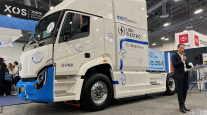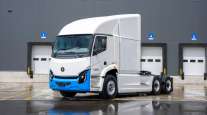Democrats Push $25 Billion to Electrify School Buses

[Stay on top of transportation news: Get TTNews in your inbox.]
Democratic lawmakers are unveiling legislation that would invest $25 billion to convert the nation’s fleet of gasoline- and diesel-powered school buses to electric vehicles, aiming at a component of President Joe Biden’s $2.25 trillion infrastructure plan to improve children’s health.
The legislation led by Sen. Alex Padilla (D-Calif.), seeks to build on the administration’s effort this week to promote the electrification of school buses, which Biden sees as an important step in addressing climate change and economic inequities.
School buses make up 90% of the nation’s total bus fleet and typically carry nearly 25 million children each day. Emissions from diesel engines may contribute to respiratory illnesses in children, studies have found, and have been linked to poor academic performance.

Padilla
The bill being introduced April 21 would authorize federal grant money over 10 years, with 40% of it devoted to replacing school buses that serve mostly nonwhite, poorer communities.
It would cover the expense of purchasing electric school buses, building charging stations and providing workforce training. The legislation also directs the Environmental Protection Agency to conduct outreach to help school districts with the transition.
“I know firsthand how outdated diesel school buses expose our children to harmful and unnecessary pollution,” Padilla told the Associated Press, explaining how as a child he frequently rode the bus to get to class and for after-school programs such as baseball games. “Growing up in the San Fernando Valley, my lungs would be filled with diesel exhaust by the time I arrived at school each day.”
“Transitioning our school bus fleet to zero-emission vehicles is an essential aspect of building equitable, sustainable infrastructure and is a wise investment in our children, our environment and our future,” he said.
Joining Padilla in co-sponsoring the legislation are Sen. Raphael Warnock (D-Ga.) and Reps. Tony Cárdenas (D-Calif.) and Jahana Hayes (D-Conn).
The lawmakers’ push comes in a week when Biden and Vice President Kamala Harris are highlighting their proposed $45 billion in infrastructure spending to accelerate the adoption of zero-emission transit buses and school buses. On April 19, Harris visited a Thomas Built Buses manufacturing plant and urged $20 billion in investments to help convert the nation’s 500,000 school buses to electric. Thomas Built Buses is a subsidiary of Daimler Trucks North America.
We were proud to host @vp today and share how we are creating a zero tailpipe emissions future with our all-electric #SafTLiner #C2 #Jouley school bus. #EV #zeroemissions #batterpowered #schoolbus #electricbus #thomasbuiltbuses pic.twitter.com/ED34QMb9sX — Thomas Built Buses (@ThomasBuiltBus) April 19, 2021
Harris’ focus on the issue dates to legislation she introduced as a California senator in 2019 that would have provided $1 billion in federal grants to help districts electrify school buses.
Padilla was appointed by California Gov. Gavin Newsom to fill Harris’ seat when she was elected vice president.

Even at Level 4 autonomy, self-driving trucks will have technical limitations. In this episode, we ask how technology developers are clearing those hurdles to make autonomous trucking a reality. We bring in Boris Sofman, head of engineering for the autonomous trucking program at Waymo. Hear a snippet above, and get the full program by going to RoadSigns.TTNews.com.
The legislation faces an uphill climb to attract 60 votes needed for passage as a stand-alone bill in a Senate divided 50-50, with Harris casting the tie-breaking vote. But as lawmakers start building the Biden infrastructure bill, the measure could become a piece of the broader package that could have more support or that congressional Democrats may try to muscle through on 51 votes via a budget process called reconciliation.
The bill has earned support from an array of outside groups, including the American Federation of Teachers, the Environmental Defense Fund, the Environmental Law & Policy Center, the League of Conservation Voters and the Union of Concerned Scientists.
“Public schools are huge consumers of mass transit, and the challenge of getting students to school buildings in a more green, efficient way is one we must tackle immediately,” AFT President Randi Weingarten said. “By investing in zero-emission school buses, we can create cleaner, healthier, more sustainable school communities where our children don’t just survive but actually thrive.”
Want more news? Listen to today's daily briefing below or go here for more info:



